- Home
- Dale Mayer
Ice Pick in the Ivy Page 3
Ice Pick in the Ivy Read online
Page 3
“What about the gardener here? Well, the current one. Granted, it’s hard to tell Fred apart from Dennis because they are both grumpy and because they both hate me and my animals.”
“But,” Nan interrupted, “Fred has a limp. You can tell them apart that way.”
“Doesn’t seem to make a difference otherwise. So, is Fred still cranky over your flagstones, so the animals and I have a shortcut to you?”
“Oh, is he ever,” Nan said with a chuckle. “He brought it up at our last tenant meeting.”
“Wow,” Doreen said. “He must really have strong feelings about them to still be angry after all this time.”
“He does. He doesn’t want you to have access to me at all.”
“I wonder why?” Doreen asked. “Sounds like he has something to hide.”
Nan’s eyebrows shot up. “Oh my,” she said. “Wouldn’t that be interesting?” Then she stopped and picked up the little metal plates. “You know something? He’s related to this guy.”
“What guy?” Doreen asked.
“The man who made these,” Nan said, looking up at her with a frown. “I just said that. Are you having trouble with your memory, dear?”
Doreen slowly sank back. “Nan, you were thinking you couldn’t remember who made these.”
“And then I told you who made them,” she said, holding one up. “It’s the gardener’s brother.”
Doreen stared at her grandmother. It wasn’t the first time she’d wondered at Nan’s strange switches from one memory to another. “What about him?”
“Just this,” Nan said. “Remember, dear? Your memory? I just told you. He made these.”
“But what are they?”
Nan patted her on the hand. “Oh, dear,” she said. “Remember? They’re labels.”
Doreen tamped down her growing impatience. “Labels for what?” she asked gently.
“Tools, of course.”
“Tools?” She looked down at the little metal stamped items and said, “Really?”
“Yes, really.” Nan chuckled. “They take pride in their work.” Just then she looked up and caught sight of the gardener, glaring at them, and she hopped to her feet and called him over.
He looked at her in surprise, then looked left, then looked right, but not seeing anybody else she could possibly be talking to, he crossed the grass to reach her.
Doreen stared at him with barely concealed resentment. How come it was okay for him to walk on the grass but not for me?
But then Nan held up one of the little metal plates, asking, “Isn’t this your brother, Frank’s, work?”
Fred looked at it, turned it over, and said, “It looks like it. Yeah, why?” And he turned his suspicious gaze on Doreen.
She gave him a bland smile back.
“No reason,” Nan said.
He looked at the second label, turned it over, nodded, and said, “I think they are Frank’s work. But they’re not normally loose like this.” He looked at Doreen. “I suppose you found them.” The accusation in his tone was quite clear.
Mugs stood, not liking Fred’s tone of voice, and he barked. Doreen reached a hand down but accidentally hit the table. The teacups bounced and the tea sloshed. Thaddeus half flew to the edge of the table and tried to peck away to get his metal pieces back again.
The gardener backed up and said, “Dirty animals.” He tossed the two metal pieces at Nan. “Keep them. Frank has lots.” And, with a final glare, he left.
Nan sat down, trying to calm Thaddeus. She gave him one of the metal plates, which he immediately brought back to Doreen.
“Oh, dear, he feels very strongly about that, doesn’t he?” Nan said. She looked at the gardener, who raced away. “And so does he, apparently.”
Doreen watched as the gardener retreated. His footsteps were faster than necessary, as if he couldn’t wait to get away from them. But she didn’t think it had anything to do with her “dirty” animals.
Chapter 5
Thursday Noon …
Doreen reached for one of the metal tags. “Other numbers are on here too.”
“Sure,” Nan said, “he used to keep a ledger of the tools he sold.”
“What kind of tools did he make?”
“Technically the wooden handles to the otherwise metal tools. It wasn’t much of a business, but he was really proud of these, and they were attached to various hammers and sledgehammers and things.”
“Huh, so he made just the handles?”
“Don’t forget, dear. Back then it wasn’t like you could turn around and get a handle from China on any given day.”
“Any idea how old these are?”
“Oh my,” Nan said. She pressed her fingers to her lips to hide her smile and stared at Doreen.
Doreen glared at her. “Now what?”
“Remember that memory of yours? These are dates, honey.”
Doreen stared down at the numbers on the tin piece and then groaned. “Mine is much harder to read. I didn’t see that. Okay, but they’re what? Twenty years old then?”
“Sure, and, yes, you could have bought stock plastic or wooden replacement handles back then, but he was trying for a small business where he could custom make stuff like that.”
“Interesting. So Frank used to repair tools as well as make handles?”
“Yes, that’s correct,” Nan said. “Now, the name of his business was something funny. I can’t remember for sure. A weird name, like, Kelowna Tool Repair or something.”
Doreen thought privately nothing was funny about that. It said where to find the business and what the business was all about, so it wasn’t a bad commercial name. “I might be able to look it up.”
“Oh, do that,” Nan said with a handclap and a bright smile. “Maybe we’ll find something exciting behind it all.”
“Maybe,” Doreen said cautiously, “but I don’t know what that could be.”
“Maybe not. On your way home, maybe walk on the far side of the creek, and see if you can come up with anything else around the same spot.”
“I can’t go home on that side now. I need to stay on my side of the creek to avoid the rising water.”
“Of course, the water level is quite a bit higher now, isn’t it?”
“It is, but still no water is running out of the sump pump hoses.”
“Perfect,” Nan said. “The ground water hasn’t soaked that far from the creek, so it’s not putting the basement in any danger.”
Every time she heard “water, basement, and danger,” it frayed Doreen’s nerves, and her blood ran cold. The last thing she wanted to consider was her basement flooding. But the basement flooding now versus the basement flooding when full of very expensive antiques were completely different stories. That Nan had kept those antiques down there all those years when they could have been destroyed still gave Doreen nightmares.
“Let me not forget the vegetables,” Nan said. She hopped up and raced into her little suite. She returned a moment later with a large wicker basket and placed it on the table. “Now tell me. Is there anything here you would like? Other than these zucchinis?” she asked, and she pulled out zucchini after zucchini after zucchini.
“They’re all zucchini?” Doreen asked.
“Yes. These came from the grocery store,” Nan said. “Somebody bought too many and brought them in.”
“Right, because it’s not that time of year for these to be ready in our local gardens yet.”
“Nope, not yet. End of July or August. Greenhouses of course would be earlier.” Then Nan pulled a few more items from the basket. “But here we have tomatoes and early salad greens.”
“Early salad greens I can definitely use,” Doreen said. “I’ll take one zucchini, but I can’t use four or five.”
“Are you sure, dear?”
“I’m sure,” she said. “One stir-fry is more than I can handle.”
“I suppose I could make zucchini bread,” Nan said with a smile. “When I have them done, you can come down and
have a slice or two.”
“That sounds like the best way to make use of these,” Doreen said. “I do love your zucchini bread.”
Then Nan brought out some white onions, green onions, tomatoes, and radishes. “The tomatoes aren’t mine,” she said, “but somehow they ended up in this basket.” She stared at the basket as if completely confused on that part.
Doreen smiled. “I’ll be happy to take the other vegetables.”
With that, Nan walked back into her little suite and brought out a paper bag in which she carefully packaged some of the vegetables for Doreen. “You should probably go home and research Frank’s company,” Nan said in a low tone.
“Why is that?” Doreen asked, as she finished her tea and the last bite of her cookie. She stared down at her empty plate in disbelief. “I can’t believe I ate that whole cookie.”
“I warned you,” Nan said. “They’re deadly.”
“They’re more than deadly,” Doreen said. “Each one is huge.”
“But there’s nothing like a cookie. When you’re having it with something like a cup of tea, it’s even more special.”
“Maybe.”
“It’ll be fine,” Nan said with a chuckle. “Besides, here’s the fresh greens to go home with you, so you’ll be eating a nice healthy salad later in the day.”
As Doreen looked down in the paper bag, she noted there were a lot of greens. As in three full days of salads. That was something she was really grateful to have. “That’ll save on my budget a little bit,” she said with a laugh. She looked at the zucchini, wondering if she should take a second small one, because, after all, it was free food. If she could find a way to cook it, with Mack’s help, then maybe it would be a nice supplement.
On that note, Nan slipped a little one into the paper bag and said, “Here, and I’ll make zucchini bread from the rest.”
“Now that would be lovely,” Doreen said. “Nothing’s like your zucchini bread. Thank you for all this.” She leaned over, kissed Nan gently on the cheek, and then called the animals to her. At the last moment, she picked up the two little silver metal tags and put them in her pocket. “And I’ll see what I can find with some research.”
Nan nodded, while reaching down to say goodbye to the animals. “I’ll ask around too.”
“Just remember,” Doreen said. “No mystery is here.”
“Of course not,” Nan said with a big smile. But it was too big a smile.
“Do you know something I don’t know?”
“I don’t know,” Nan said in confusion. “Do I?”
Doreen groaned. “Is there a mystery surrounding your gardener and his brother?”
“Well, their parents disappeared from one day to the next,” Nan said. “So that’s a mystery.”
“It doesn’t have to be a mystery. When did they ‘disappear’?”
“About fifteenish years ago,” Nan said, as she tapped her chin. “I think it must have been at least fifteen years ago.”
“Interesting. So a few years after these particular metal pieces were made.”
Nan brightened. “Yes. So maybe you should check into that. Maybe the brothers murdered their parents,” she said with relish.
Doreen worried about her grandmother somehow tying one incident to another, when the two might have been five years apart. Granted, each involved the same family. Doreen sighed. Now she knew how Mack felt when she posited some of her theories to him. “Or maybe the parents died naturally in a cancer clinic, and the brothers just didn’t share any of their troubles because they’re not the kind of people who wear their hearts on their sleeves.”
“It’s possible,” Nan said with disappointment. “I don’t remember too much about it. I don’t even know if it was such a mystery back then. I just know the parents were here one day and gone the next. Everyone thought they’d upped and gone back east, as in East Coast, without telling anyone.”
“That’s what happens with old age and death,” Doreen said drily.
“Their sister disappeared too,” Nan said, as she stared off in the distance where the gardener had gone.
Doreen frowned. “All three at the same time?” That didn’t bode well.
Nan nodded, still staring off into the landscape.
Doreen made a mental note to clarify these dates with Mack. “What happened to her?”
“I don’t know,” she said. “She had Down syndrome. She was a lovely girl though. Beautifully happy and always smiling, such a great help to have around.”
“You knew the whole family?”
“I did, indeed. Used to see them a fair bit because we belonged to the same gardening club, and sometimes we would go on long nature walks together with the rest of the group. There were always tea times and, you know, various little social activities. They were a lovely couple and devoted to their family.”
“Just the two boys and the sister?”
Nan nodded. “And not one of them had any kids.”
“Oh, too bad,” Doreen said. “It’s sad when the family line is about to run out.”
“It is, indeed,” Nan said, with a meaningful look in Doreen’s direction.
She rolled her eyes as she stepped onto the first of the flagstones. “Don’t even go in that direction with me, Nan.”
“Mack would make lovely little babies with you,” Nan called after her.
That didn’t even deserve an answer. Not in public, for sure.
When she and her animals got to the other side of the lawn, Doreen turned and waved goodbye and walked toward the creek. She didn’t even want to think about Mack and making little babies. That was not a path guaranteed to get her in the right frame of mind. Mack had a brother, that she knew of—an attorney checking into her own divorce attorney for her lack of ethics. Yet Doreen was an only child, raised by her mother. So Doreen wasn’t used to being around many males as she grew up.
She and Mack got along well enough, but they were not even close to having that kind of relationship to be thinking about babies. At least she didn’t think so. In the back of her mind this little voice said, But you could be, down the road. You know he’s interested. At the same time it was so not what she needed to hear from her grandmother. Especially with Nan practically yelling it from Rosemoor, where the residents were deeply engrossed in hearing all the latest rumors.
Doreen shook her head and then thought more about a set of parents and their daughter all going missing at the same time. But the trouble was, even though Nan had said it was at the same time, it could have been over several years. It was possible the sister died of natural causes. It was a sad fact that a lot of people with Down syndrome didn’t have the same life expectancy as their parents did. She could have had other health issues too. Maybe she passed first. Doreen would have to look it up when she got home.
Her fingers played with the little metal plates as she headed home. She had no way to get across the creek to the same spot where she’d found the second one—or rather, where Thaddeus had found the second label. She reached up and gently stroked Thaddeus under the chin. “We’re not going back there to take another look.”
He gave a loud squawk in her ear. It was loud enough that she had to twist her head to the side as she listened to him. “Okay, fine,” she said. “Let’s go take a quick glance.”
Moving carefully, with Mugs racing ahead and Goliath right on his tail, Doreen and Thaddeus made their way across the creek at the narrowest and safest point from this end, wondering if she could do that again anytime soon. The water flowed with serious force. On the far side of the creek she carefully headed to where the second little piece had been. It took some backtracking and, after a while, she finally found the spot. Thaddeus’s footprints were all around the area. She used her sandal to kick away some of the sand and a few of the smaller rocks. The ivy served as ground cover and was tangled all around the area. She pulled several long strands out of the way. “If these came off tools,” she said, “what would they be doing here?”
&
nbsp; She kicked away a few more rocks, and, sure enough, she found some wood sticking up. She bent down for a closer look. “Aha!”
She popped her head up, finding her bearings. They were almost at the mouth of the river. This whole side of the river could be turned into a walkway to the lake, only maybe twenty-five feet ahead of her. It was possible the river was wider back then too, sometime after these particular plates had been crafted some twenty years ago. Yet tossing the nameplates here could have happened one day after the labels had been created, or yesterday.
Doreen sighed, wishing she had a more finite time frame for when these tags had been discarded back here.
She used her fingers to dig out the handle. This wooden handle was bigger than the one, say, on her gardening spade. Which gave her a clue that this could be a much longer and sturdier tool. Mugs realized she was on the hunt and came to her side, his big sniffer moving up and down, sending sand flying everywhere with each snort. Then he started to dig, his big square paws churning out the dirt. But also a lot of rock was here.
She helped him out by moving a bunch of rocks as he dug a decent-size hole. Still she saw no end to the tool. To be buried by so much soil and rocks and sand—courtesy of the flowing river activity—not to mention the well-established ivy growth here, all must mean this tool’s been here for years and years. Maybe a decade? Unless, of course, somebody purposely buried it here like this.
When she could finally grab the handle with both hands, she tugged it hard, and more dirt and rock shifted. But it was still stuck. She eventually coaxed it from its deep hole and lifted it up, as she studied the odd-looking thing in her hand. “Wow,” she said, “what is this?”
She noted a place on the handle where the plate should have been. It was ever-so-slightly indented and had little pinholes, as if the metal had been nailed right into that place. She laid it off to the side and said, “You’d think there would be two of them, since I have two tags.”
She kept searching but found no sign of a second handle, at least not with her small and limited ability to move the ground and dig by hand. She’d have to return with a shovel to make better headway, as this area had become very overgrown with time.

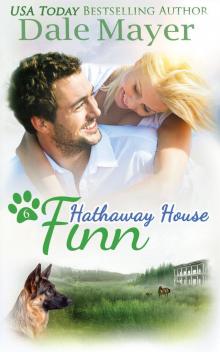 Finn
Finn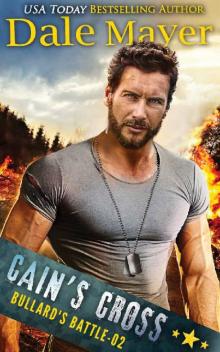 Cain's Cross (Bullard's Battle Book 2)
Cain's Cross (Bullard's Battle Book 2) Heath: A Hathaway House Heartwarming Romance
Heath: A Hathaway House Heartwarming Romance Killian
Killian Keane
Keane Melissa: A Hathaway House Heartwarming Romance
Melissa: A Hathaway House Heartwarming Romance Denton: A Hathaway House Heartwarming Romance
Denton: A Hathaway House Heartwarming Romance Colton: SEALs of Honor, Book 23
Colton: SEALs of Honor, Book 23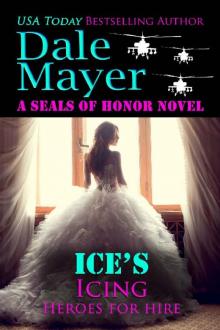 Ice's Icing: A SEALs of Honor World Novel (Heroes for Hire Book 20)
Ice's Icing: A SEALs of Honor World Novel (Heroes for Hire Book 20) Elliot (Hathaway House Book 5)
Elliot (Hathaway House Book 5)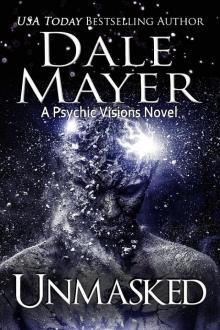 Unmasked
Unmasked Zack's Zest: A SEALs of Honor World Novel (Heroes for Hire Book 24)
Zack's Zest: A SEALs of Honor World Novel (Heroes for Hire Book 24)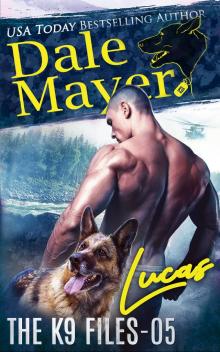 Lucas
Lucas Lennox
Lennox Kerrick
Kerrick Nico (The Mavericks Book 8)
Nico (The Mavericks Book 8) Baylor: SEALs of Honor, Book 26
Baylor: SEALs of Honor, Book 26 SEALs of Honor: Kanen
SEALs of Honor: Kanen Brock
Brock SEALs of Honor: Taylor
SEALs of Honor: Taylor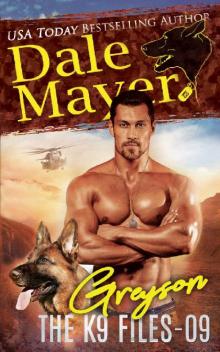 Greyson (The K9 Files)
Greyson (The K9 Files) Jackson
Jackson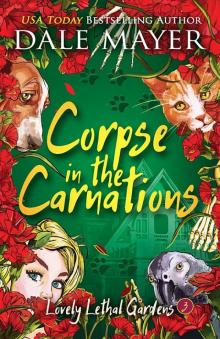 Corpse in the Carnations
Corpse in the Carnations Lance: A Hathaway House Heartwarming Romance
Lance: A Hathaway House Heartwarming Romance Biker Baby Blues--Morgan Book 4
Biker Baby Blues--Morgan Book 4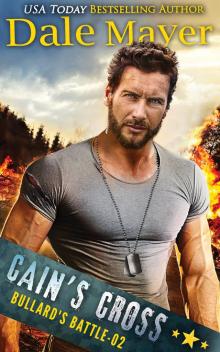 Cain's Cross
Cain's Cross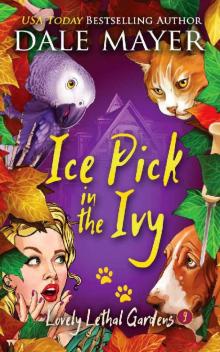 Ice Pick in the Ivy (Lovely Lethal Gardens Book 9)
Ice Pick in the Ivy (Lovely Lethal Gardens Book 9) Blaze
Blaze Iain: A Hathaway House Heartwarming Romance
Iain: A Hathaway House Heartwarming Romance Tucker (The K9 Files Book 13)
Tucker (The K9 Files Book 13) Weston
Weston Jax (The Mavericks Book 3)
Jax (The Mavericks Book 3)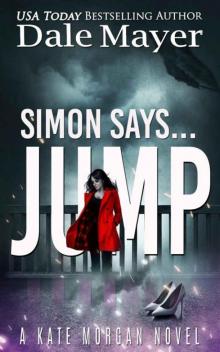 Simon Says... Jump (Kate Morgan Thrillers Book 2)
Simon Says... Jump (Kate Morgan Thrillers Book 2)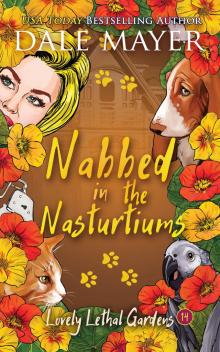 Nabbed in the Nasturtiums
Nabbed in the Nasturtiums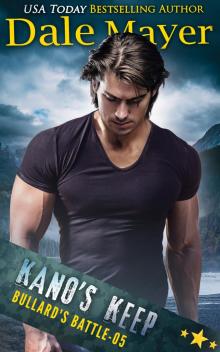 Kano's Keep
Kano's Keep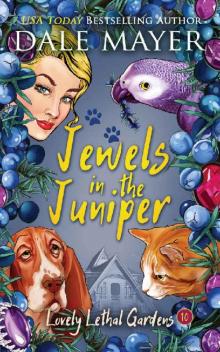 Jewels in the Juniper (Lovely Lethal Gardens Book 10)
Jewels in the Juniper (Lovely Lethal Gardens Book 10) Ryker (The Mavericks Book 6)
Ryker (The Mavericks Book 6) Miles
Miles Asher (The Mavericks Book 5)
Asher (The Mavericks Book 5)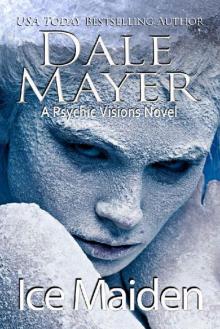 Ice Maiden : A Psychic Visions Novel
Ice Maiden : A Psychic Visions Novel Aaron
Aaron Jaden: A Hathaway House Heartwarming Romance
Jaden: A Hathaway House Heartwarming Romance Deep Beneath: A Psychic Vision Novel
Deep Beneath: A Psychic Vision Novel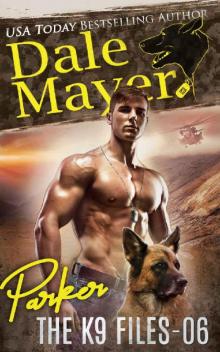 Parker (The K9 Files Book 6)
Parker (The K9 Files Book 6) Ethan
Ethan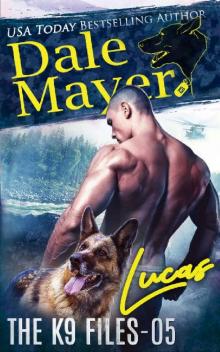 Lucas (The K9 Files Book 5)
Lucas (The K9 Files Book 5) Snap, Crackle ...
Snap, Crackle ... Tanner: SEALs of Honor, Book 18
Tanner: SEALs of Honor, Book 18 Shane
Shane SEALs of Honor: Baylor
SEALs of Honor: Baylor Heath
Heath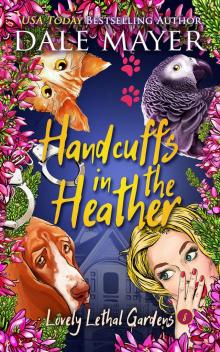 Handcuffs in the Heather
Handcuffs in the Heather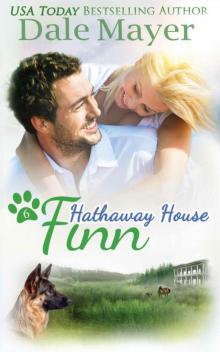 Finn (Hathaway House Book 6)
Finn (Hathaway House Book 6) Noah's Nemesis
Noah's Nemesis Elliot
Elliot Jaden
Jaden Kerrick (The Mavericks Book 1)
Kerrick (The Mavericks Book 1) Ryland’s Reach (Bullard's Battle Book 1)
Ryland’s Reach (Bullard's Battle Book 1)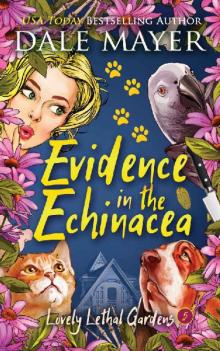 Evidence in the Echinacea (Lovely Lethal Gardens Book 5)
Evidence in the Echinacea (Lovely Lethal Gardens Book 5) Rowan (The K9 Files Book 10)
Rowan (The K9 Files Book 10) Gregory
Gregory Reyes’s Raina
Reyes’s Raina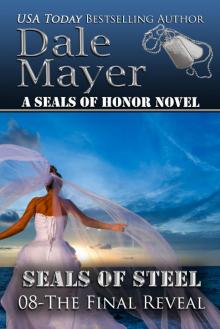 The Final Reveal
The Final Reveal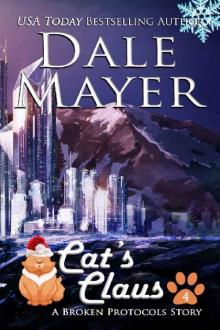 Cat's Claus
Cat's Claus Jerricho
Jerricho Vince's Vixen
Vince's Vixen Jax
Jax From the Ashes: A Psychic Visions Novel
From the Ashes: A Psychic Visions Novel Johan's Joy
Johan's Joy Simon Says... Hide (Kate Morgan Thrillers Book 1)
Simon Says... Hide (Kate Morgan Thrillers Book 1) Keane (The Mavericks Book 9)
Keane (The Mavericks Book 9)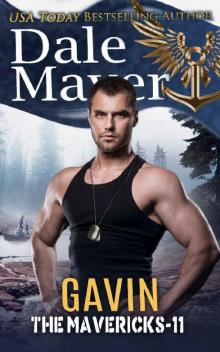 Gavin (The Mavericks Book 11)
Gavin (The Mavericks Book 11) Fallon's Flaw
Fallon's Flaw Johan's Joy: A SEALs of Honor World Novel (Heroes for Hire Book 21)
Johan's Joy: A SEALs of Honor World Novel (Heroes for Hire Book 21) Dezi’s Diamond
Dezi’s Diamond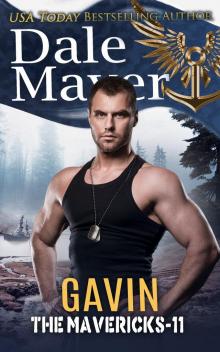 Gavin
Gavin Keith: A Hathaway House Heartwarming Romance
Keith: A Hathaway House Heartwarming Romance Eton's Escape (Bullard's Battle Book 3)
Eton's Escape (Bullard's Battle Book 3) Eton's Escape
Eton's Escape Galen's Gemma
Galen's Gemma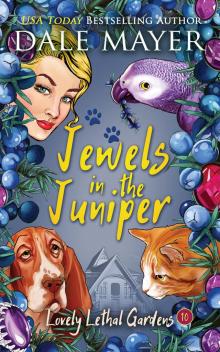 Jewels in the Juniper
Jewels in the Juniper SEALs of Honor: Axel
SEALs of Honor: Axel Aaron: A Hathaway House Heartwarming Romance
Aaron: A Hathaway House Heartwarming Romance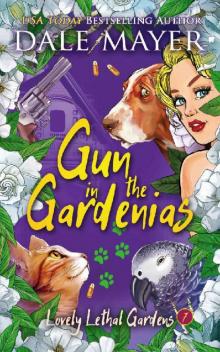 Gun in the Gardenias (Lovely Lethal Gardens Book 7)
Gun in the Gardenias (Lovely Lethal Gardens Book 7) Diesel (The Mavericks Book 13)
Diesel (The Mavericks Book 13) Kurt (The K9 Files Book 12)
Kurt (The K9 Files Book 12) Miles (The Mavericks Book 7)
Miles (The Mavericks Book 7) Dagger in the Dahlias
Dagger in the Dahlias Geir
Geir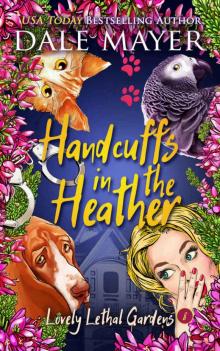 Handcuffs in the Heather (Lovely Lethal Gardens Book 8)
Handcuffs in the Heather (Lovely Lethal Gardens Book 8) Keith
Keith Iain
Iain Beau
Beau Biker Blues
Biker Blues From the Ashes
From the Ashes SEALs of Honor: Troy
SEALs of Honor: Troy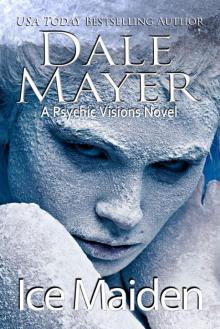 Ice Maiden
Ice Maiden Lennox (The Mavericks Book 10)
Lennox (The Mavericks Book 10) Dagger in Dahlias
Dagger in Dahlias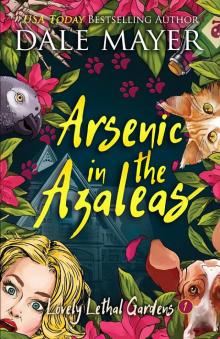 Arsenic in the Azaleas
Arsenic in the Azaleas Bonaparte's Belle: A SEALs of Honor World Novel (Heroes for Hire Book 24)
Bonaparte's Belle: A SEALs of Honor World Novel (Heroes for Hire Book 24)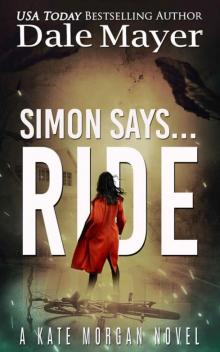 Simon Says... Ride (Kate Morgan Thrillers Book 3)
Simon Says... Ride (Kate Morgan Thrillers Book 3) SEALs of Honor: Hawk
SEALs of Honor: Hawk Cole
Cole Carter
Carter Beau (The Mavericks Book 4)
Beau (The Mavericks Book 4) Psychic Visions 08-Now You See Her...
Psychic Visions 08-Now You See Her...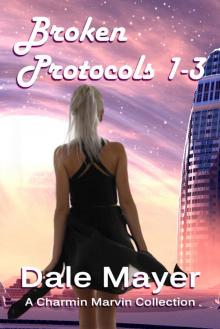 Broken Protocols 1-3
Broken Protocols 1-3 Nash
Nash Griffin (The Mavericks Book 2)
Griffin (The Mavericks Book 2) Tucker
Tucker![Biker Blues_Morgan [Part 1] Read online](http://i1.bookreadfree.com/i/03/21/biker_blues_morgan_part_1_preview.jpg) Biker Blues_Morgan [Part 1]
Biker Blues_Morgan [Part 1] Stroke of Death
Stroke of Death Logan's Light: A SEALs of Honor World Novel (Heroes for Hire Book 6)
Logan's Light: A SEALs of Honor World Novel (Heroes for Hire Book 6) Biker Blues: Morgan (Biker Blues Book 1)
Biker Blues: Morgan (Biker Blues Book 1)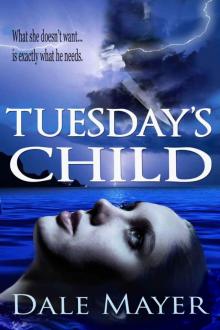 Tuesday's Child (Book 1 of Psychic Visions, a paranormal romantic suspense)
Tuesday's Child (Book 1 of Psychic Visions, a paranormal romantic suspense) Pierce
Pierce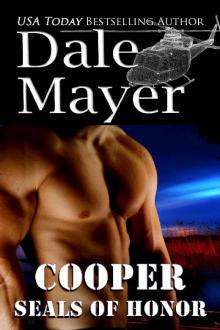 SEALs of Honor: Cooper
SEALs of Honor: Cooper Griffin
Griffin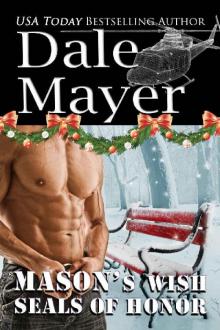 SEALs of Honor: Mason's Wish
SEALs of Honor: Mason's Wish SEALs of Honor: Brett
SEALs of Honor: Brett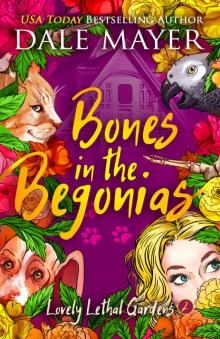 Bones in the Begonias
Bones in the Begonias Darkest Designs
Darkest Designs Levi's Legend: A SEALs of Honor World Novel (Heroes for Hire Book 1)
Levi's Legend: A SEALs of Honor World Novel (Heroes for Hire Book 1) Tanner
Tanner Vampire in Chaos
Vampire in Chaos Itsy-Bitsy Spider
Itsy-Bitsy Spider Gregory: A Hathaway House Heartwarming Romance
Gregory: A Hathaway House Heartwarming Romance North’s Nikki
North’s Nikki Carter (The K9 Files Book 7)
Carter (The K9 Files Book 7)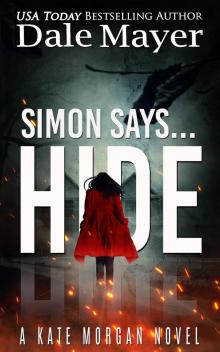 Simon Says... Hide
Simon Says... Hide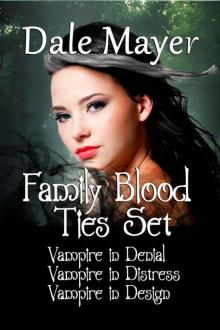 Family Blood Ties Set - 3 books in 1
Family Blood Ties Set - 3 books in 1 Tyson's Treasure_A SEALs of Honor World Novel
Tyson's Treasure_A SEALs of Honor World Novel SEALs of Honor: Evan
SEALs of Honor: Evan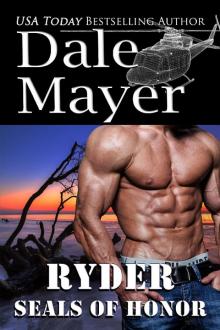 Ryder
Ryder Scales: Of Justice (Broken But ... Mending Book 3)
Scales: Of Justice (Broken But ... Mending Book 3)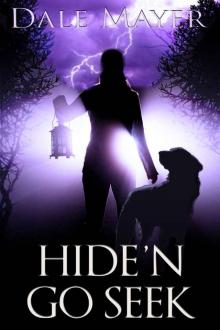 Hide'n Go Seek (Book 2 of Psychic Visions, a paranormal romance)
Hide'n Go Seek (Book 2 of Psychic Visions, a paranormal romance) Zane
Zane Eyes to the Soul
Eyes to the Soul Genesis
Genesis SEALs of Honor: Shadow
SEALs of Honor: Shadow Jace’s Jewel
Jace’s Jewel Corey
Corey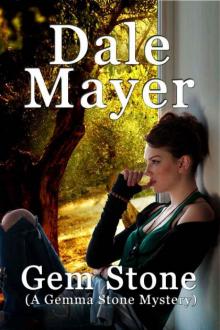 Gem Stone
Gem Stone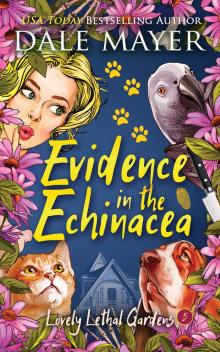 Evidence in the Echinacea
Evidence in the Echinacea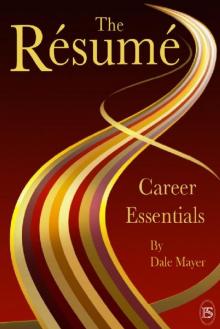 Career Essentials_The Interview
Career Essentials_The Interview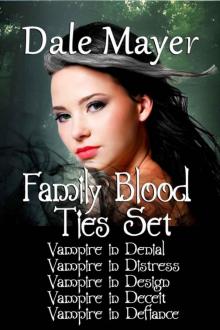 Family Blood Ties Set 5 in 1
Family Blood Ties Set 5 in 1 Tyson's Treasure: A SEALs of Honor World Novel (Heroes for Hire Book 10)
Tyson's Treasure: A SEALs of Honor World Novel (Heroes for Hire Book 10)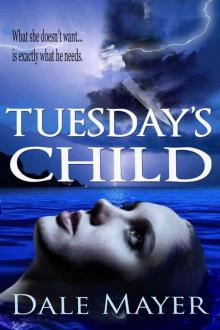 Tuesday's Child BK 1
Tuesday's Child BK 1 Greyson
Greyson Warrick
Warrick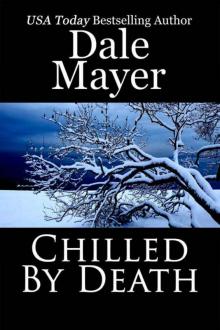 Chilled by Death
Chilled by Death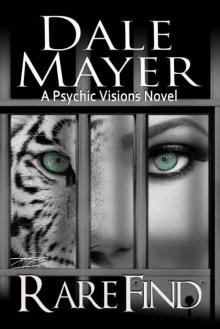 Rare Find
Rare Find Michael’s Mercy
Michael’s Mercy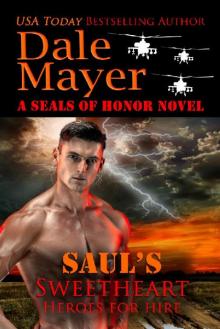 Saul’s Sweetheart
Saul’s Sweetheart Into the Abyss: A Psychic Visions Novel (Psychic Visions Series Book 10)
Into the Abyss: A Psychic Visions Novel (Psychic Visions Series Book 10) Vampire in Control
Vampire in Control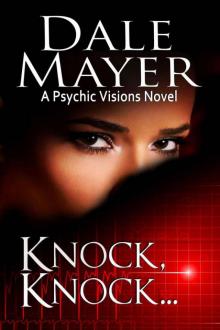 Knock, knock...
Knock, knock...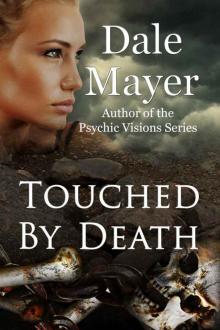 Touched by Death
Touched by Death Anders’s Angel
Anders’s Angel Harrison's Heart (Heroes for Hire Book 7)
Harrison's Heart (Heroes for Hire Book 7) Shattered: A Psychic Visions Novel
Shattered: A Psychic Visions Novel Flynn's Firecracker: A SEALs of Honor World Novel (Heroes for Hire Book 5)
Flynn's Firecracker: A SEALs of Honor World Novel (Heroes for Hire Book 5) Vampire in Crisis
Vampire in Crisis Vampire in Conflict
Vampire in Conflict Deadly Designs
Deadly Designs SEALs of Honor: Devlin
SEALs of Honor: Devlin Liam’s Lily
Liam’s Lily Erick
Erick Rory’s Rose
Rory’s Rose Dakota’s Delight
Dakota’s Delight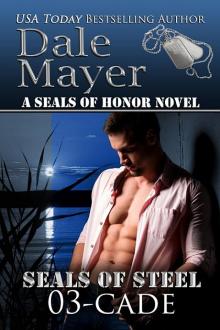 Cade
Cade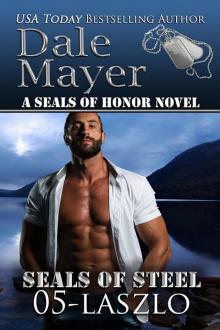 Laszlo
Laszlo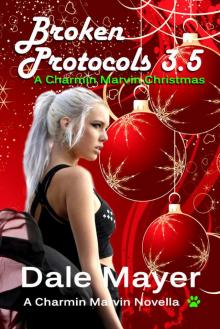 Broken Protocols 3.5
Broken Protocols 3.5 Tyson's Treasure
Tyson's Treasure Brandon's Bliss
Brandon's Bliss Rhodes's Reward: A SEALs of Honor World Book (Heroes for Hire 4)
Rhodes's Reward: A SEALs of Honor World Book (Heroes for Hire 4)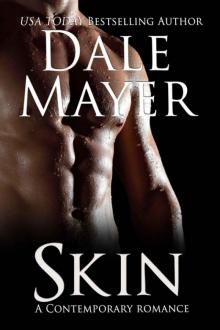 Skin
Skin SEALs of Honor: Dane
SEALs of Honor: Dane SEALs of Honor: Chase
SEALs of Honor: Chase Stone's Surrender: A SEALs of Honor World Novel (Heroes for Hire Book 2)
Stone's Surrender: A SEALs of Honor World Novel (Heroes for Hire Book 2) Biker Blues: Morgan (Biker Blues Book 3)
Biker Blues: Morgan (Biker Blues Book 3) Badger
Badger Celeste
Celeste Scars
Scars